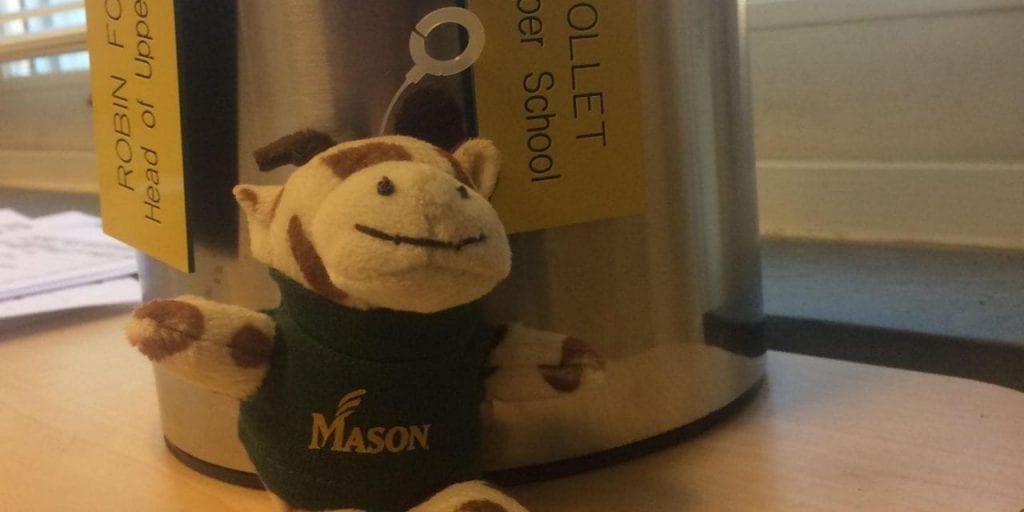The giraffe, perched on my desk since the beginning of December, smells a bit of maple syrup and IHOP pancakes.
He came to my office, courtesy of a brief conversation I had with the directors of Cary Academy’s Speech and Debate team. At the start of the school year, I had mentioned to Mr. Pellicciotta and Mrs. Nix that I was curious about the team. “Even though I’ve been at CA for some time,” I said, “I’ve never actually seen a debate tournament. I would love to experience one.”
The glint in their eyes should have made me nervous, especially when they both answered, even before I had finished my sentence: “we would love for you to come. Maybe George Mason? You could judge. Since you’re an English teacher, the training wouldn’t take that long. We promise.”
“Sure,” I said.
“Done,” they said. The glint sparkled. Their smiles widened.
So that’s how I found myself, one Friday night in early December, listening to several members of the Speech and Debate team practice their pieces in a hotel on the outskirts of Washington, D.C. Mrs. Nix was holding court, simultaneously listening to a presenter, offering her suggestions, giving me pointers as a judge, and keeping time.
“Listen to this,” she said. The student stepped forward, her frame still, a slim folder of prose and poetry in her hands. Between two breaths, she transformed from a soft-spoken teenager to a dynamo driven by language. She launched into an impassioned, creative presentation built from the published works of poets and authors.
“Isn’t that fantastic?” Mrs. Nix said to me, before turning to the presenter. “But let’s talk about what you do with your hands at that one point…”
Other sessions followed that evening—practice for the speakers, and training for me.
The next day, we pulled up to George Mason University, and we all trooped into the student union. Our kids were buzzing with energy, the adults were chatting, we found our spots in a collection of lunch tables. Ties were straightened. Bagels were gobbled. Coffee was quaffed. And then the day truly began.
That day was a curious mix of energy. Students scattered to the classrooms around campus, debating, or presenting information, or offering humorous interpretations of stories, or developing impromptu speeches on current events. After their rounds, they wandered through our dining hall encampment, informing about their perceived successes or mistakes before rushing off to their next presentations. The adults followed similar patterns: we judged students from other schools, brought the results back from the rounds, and meandered to our Cary Academy claim beside the central stairway and the coffee and sandwich shop.
In those pauses between the official tournament, I watched our students practice their curiosity. They all generally asked each other that basic question between rounds: “how did you do?” But they quickly moved beyond the simple query. “Did you hear about that argument the other team made?” “Did that info speaker really reference quantum physics and a North Korean dictator and the Fountain of Youth?*” “Have you thought about trying Humorous Interpretation? You would be SO good at it!” In short, our students’ excitement and curiosity spilled outward, courtesy of their joy in the activity, the training they had received, and the expectations instilled.
And that curiosity welled up in quieter ways as well. Students would see me returning from a round and ask, “wait—Mr. Follet, did you just judge Extemp?” I would reply in the affirmative, and they would ask, “how was it?” Or we would all be sitting at the tables, and a student would find himself or herself holding forth, and for a few moments, they forgot that I was the Head of Upper School as they expounded on the joy of debate (no matter who won), or the beauty of cartoons, or the economic implications of certain fiscal policies.
And that’s how the giraffe came into my possession. I had left my backpack with the CA contingent as I stepped away to purchase a bottle of water. When I returned, the little keychain stuffed animal was perched jauntily on my pack, its tiny George Mason sweater sporting GMU colors.
“He was guarding your backpack. You know, you shouldn’t just walk away from your stuff,” the student said, trying to hold back the smirk as she parroted words back to me that I had used hundreds of times with students. I laughed, and thanked the giraffe, along with anyone who might have helped him watch my belongings.
Our students did well in that tournament, no matter how they individually placed. We ended the competition experience late at night, sitting in an IHOP, the students snarfing down food as they looked at their individual round sheets, discussing the judges’ comments and scores.
We returned to North Carolina the following day, discussions flaming to life along the bus, then quieting as sleep overtook us.
Most of those specific speech and debate students won’t remember exact details from the GMU tournament as the years pass. But they will remember the skills taught through the debate classes (and through all their courses), abilities that they demonstrated to an outsider over two tournament days: the need to embrace the joy associated with curiosity; the ability to share that joy with others; the gift of small kindnesses.
So, the giraffe perches on my desk, a reminder of kindness, and curiosity, and a willingness to talk across titles and ages. And IHOP pancakes.
*Yes.

